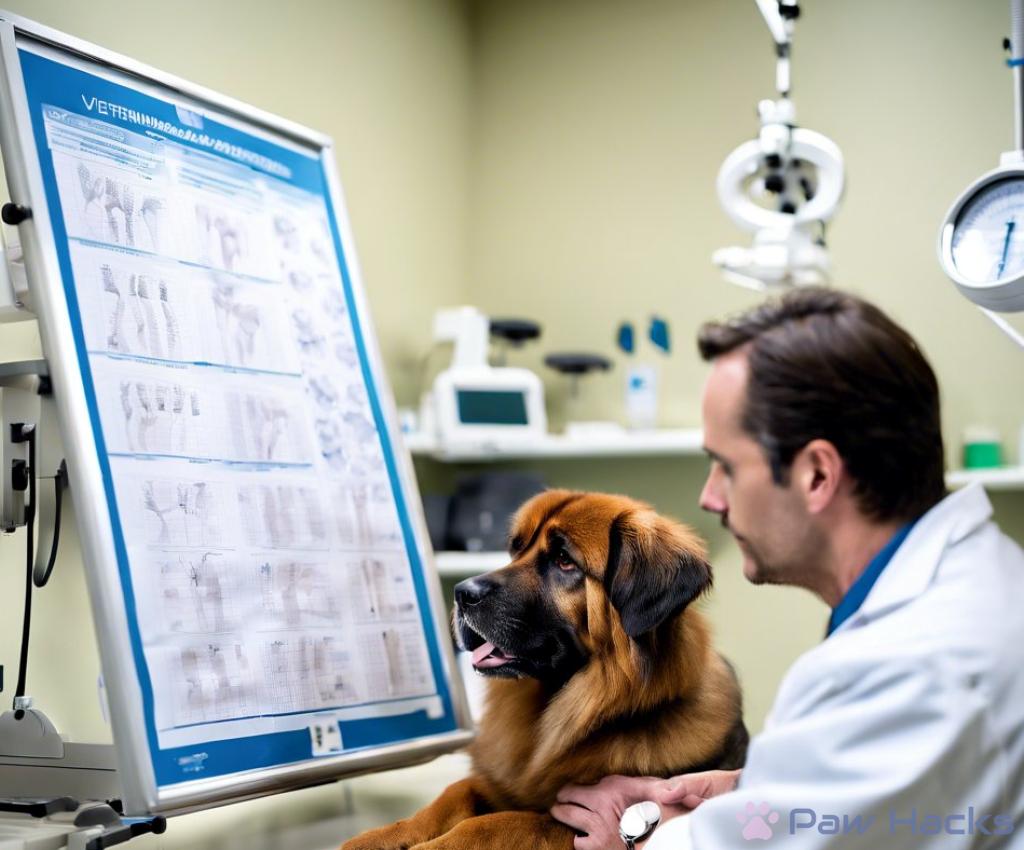Canine Hypothyroidism Treatment
Understanding Canine Hypothyroidism: A Comprehensive Overview
Canine hypothyroidism is a condition that affects many dogs, but it’s often misunderstood. This disorder occurs when the thyroid gland fails to produce enough thyroid hormones, which play a crucial role in regulating metabolism, growth, and energy levels. Understanding this condition is key to ensuring your furry friend stays healthy and happy.
The thyroid gland, located in the neck, produces hormones that influence nearly every organ in a dog’s body. When these hormones are insufficient, various symptoms can arise, leading to a decline in overall health. Recognizing these symptoms early can make a significant difference in the treatment plan and the quality of life for your dog.
Being aware of the symptoms of canine hypothyroidism is crucial for early diagnosis. Symptoms can often be mistaken for other health issues, leading to delays in treatment. Common signs include lethargy, weight gain, cold intolerance, and skin problems. Understanding these symptoms can help pet owners take action swiftly.
When you notice any of these signs, it’s essential to consult a veterinarian. A thorough examination will often include blood tests to measure the levels of thyroid hormones. This diagnostic step is vital to confirm the condition and rule out other potential health problems.
| Symptom | Description |
|---|---|
| Lethargy | Reduced energy levels and increased sleeping |
| Weight Gain | Unexplained increase in weight despite a stable diet |
| Cold Intolerance | Increased sensitivity to cold temperatures |
| Skin Issues | Dry, flaky skin or hair loss |
Once diagnosed, canine hypothyroidism is manageable with appropriate treatment. The most common method involves daily medication that replaces the missing thyroid hormones. This treatment helps restore normal hormone levels and alleviates many of the symptoms associated with the condition.
In addition to medication, regular check-ups with your veterinarian are essential to monitor hormone levels and adjust dosages as necessary. A well-balanced diet and maintaining a healthy weight are also critical components of managing this condition effectively.
- Medication: Synthetic thyroid hormones are typically prescribed.
- Regular Monitoring: Routine blood tests to check hormone levels.
- Dietary Adjustments: Ensuring a balanced diet to support overall health.
Essential Diagnostic Tests for Canine Hypothyroidism: What Every Pet Owner Should Know

When it comes to addressing canine hypothyroidism, understanding the diagnostic process is crucial for every pet owner. Recognizing the symptoms is just the first step; the next vital phase involves conducting specific tests that provide insight into your dog’s thyroid function. Knowing what these tests entail can empower you to be an advocate for your furry friend’s health.
The primary tool for diagnosing canine hypothyroidism is a series of blood tests. The most significant of these is the measurement of thyroid hormone levels, specifically thyroxine (T4) and thyroid-stimulating hormone (TSH). A low level of T4, combined with a high level of TSH, typically indicates hypothyroidism. It’s important to understand that these tests should be interpreted in context; other factors, such as age and breed, can influence hormone levels. In some cases, your veterinarian might recommend additional tests to ensure an accurate diagnosis.
While blood tests provide critical information, they are often complemented by other tests to form a complete picture of your dog’s health. For instance, a thyroid panel can offer a more detailed analysis of thyroid function. Furthermore, tests to rule out other conditions that may mimic hypothyroidism symptoms, such as Cushing’s disease or diabetes, are equally essential. By undergoing these comprehensive evaluations, you can ensure that your dog’s treatment plan is tailored to their specific needs.
Understanding the diagnostic tests for canine hypothyroidism can significantly influence your pet’s treatment journey. By proactively engaging with your veterinarian and being informed about the necessary tests, you can contribute to a more effective management plan. Regular monitoring and adjustments based on these test results will not only help in managing your dog’s condition but will also enhance their quality of life. Remember, a well-informed pet owner is an essential ally in the quest for your dog’s health.
Effective Treatment Options for Dogs with Hypothyroidism: Finding the Right Approach
For many dogs diagnosed with hypothyroidism, medication is the cornerstone of treatment. The most common approach involves the use of synthetic thyroid hormones, primarily levothyroxine. This medication effectively compensates for the underactive thyroid gland, helping to restore normal hormone levels in your dog’s body. It is crucial to administer this medication as prescribed by your veterinarian to ensure optimal results.
Monitoring your dog’s response to the medication is essential. Regular follow-up appointments will allow your vet to assess hormone levels through blood tests, ensuring that the dosage is appropriate. Adjustments may be necessary based on your dog’s progress, lifestyle, and any changes in health status. This tailored approach not only addresses the symptoms but also supports your dog’s overall well-being.
Alongside medication, diet plays a pivotal role in managing canine hypothyroidism. A well-balanced diet can significantly impact your dog’s health and help mitigate some symptoms associated with this condition. It is advisable to consult with your veterinarian regarding the best dietary choices for your pet. They may recommend specific foods that are rich in essential nutrients and low in fillers, ensuring that your dog receives the necessary vitamins and minerals for optimal thyroid function.
In some cases, there may be a need for dietary supplements to support your dog’s health further. Omega-3 fatty acids, for instance, can help improve skin and coat quality, which is often affected in dogs with hypothyroidism. Maintaining a healthy weight through proper nutrition is critical, as obesity can complicate the management of this condition.
In addition to conventional treatment options, many pet owners are exploring holistic approaches to support their dogs with hypothyroidism. Integrative therapies, such as acupuncture or herbal remedies, may provide complementary benefits when used alongside traditional treatments. However, it is essential to discuss these options with your veterinarian to ensure they are safe and beneficial for your dog’s specific needs.
Furthermore, fostering a stress-free environment can greatly enhance your dog’s quality of life. Regular exercise, mental stimulation, and a consistent routine can help your dog feel more energetic and engaged. Remember, each dog is unique, and finding the right combination of treatments and lifestyle modifications may take time. By actively participating in your dog’s health journey and working closely with your veterinarian, you can develop a comprehensive treatment plan that promotes your furry friend’s well-being.
Nutritional Considerations for Dogs Undergoing Hypothyroidism Treatment
When your dog is diagnosed with hypothyroidism, addressing their diet becomes a paramount part of the treatment process. The right nutritional choices can not only support hormone therapy but also enhance overall health and vitality. As you embark on this journey to improve your dog’s well-being, understanding the nutritional needs specific to hypothyroidism is essential. A tailored diet can help mitigate some of the symptoms associated with the condition and promote a healthier lifestyle.
To properly manage canine hypothyroidism, it is vital to include high-quality protein sources and essential fatty acids in your dog’s diet. Proteins are crucial for tissue repair and energy levels, while fatty acids, particularly Omega-3, can help with skin and coat health, which are often compromised in hypothyroid dogs. Additionally, consider incorporating foods rich in antioxidants such as fruits and vegetables, which contribute to immune system support.
Moreover, some pet owners may be concerned about the presence of fillers and artificial additives in commercial dog foods. A diet that is low in carbohydrates can be beneficial since excess carbs can lead to weight gain, complicating the condition. Always read ingredient labels and opt for brands that emphasize whole food sources. In doing so, you promote an optimal metabolic environment for your dog.
Every dog is unique, and their dietary needs may vary based on several factors including age, weight, and activity level. It is advisable to consult with your veterinarian to create a customized meal plan that suits your dog’s specific requirements. They may recommend specific dietary formulas or supplements that bolster thyroid function and overall health.
For example, the addition of iodine and selenium can be beneficial, as these minerals play crucial roles in thyroid health. However, the balance is vital, as too much can be harmful. Ongoing adjustments based on your dog’s response to treatment and regular check-ups will ensure that the nutritional approach remains effective. By integrating these dietary considerations, you not only enhance the efficacy of the treatment but also contribute to a happier, healthier life for your furry companion.
Monitoring and Managing Your Dog’s Hypothyroidism: Tips for Long-Term Health
Successfully managing your dog’s hypothyroidism requires diligence and consistency. Setting up a routine for monitoring their health can significantly enhance their treatment outcomes. By keeping a close watch on your dog’s condition, you can identify any changes or potential issues early, allowing for timely interventions. This proactive approach not only ensures that your dog feels their best but also helps build a strong partnership with your veterinarian.
Regular Veterinary Visits: Schedule consistent check-ups with your veterinarian to assess your dog’s thyroid levels and overall health. These visits are a chance to discuss any symptoms you may have noticed and adjust medication dosages as necessary.
Daily Observations: Pay attention to your dog’s behavior, energy levels, and appetite. Keeping a journal can help track any fluctuations over time, providing valuable insights for your vet during appointments.
Treatment for canine hypothyroidism is not a one-size-fits-all solution. As your dog’s needs may change over time, being flexible with their treatment plan is crucial. Open communication with your veterinarian about your dog’s response to medication and lifestyle adjustments will help achieve optimal results.
Medication Adherence: Ensure that you administer the prescribed medication consistently and correctly. Skipping doses can lead to fluctuations in hormone levels, making it harder to achieve stability.
Dietary Changes: As your dog’s weight and health evolve, their nutritional needs may also shift. Discuss any necessary dietary adjustments with your vet to maintain a balanced and appropriate diet.
Maintaining your dog’s health over the long term requires a holistic approach that encompasses both physical and emotional well-being. By incorporating specific practices into your routine, you can enhance your dog’s quality of life while effectively managing hypothyroidism.
Key Practices for Your Dog:
- Regular Exercise: Engage your dog in daily physical activities tailored to their energy levels. This not only aids weight management but also promotes mental stimulation.
- Stress Reduction: Creating a calm environment can help alleviate stress, which is beneficial for your dog’s overall health. Consider incorporating activities like gentle play, cuddling, or quiet relaxation time.
- Stay Informed: Educate yourself about canine hypothyroidism and emerging treatment options. Being knowledgeable will empower you to make informed decisions regarding your dog’s care.
By adhering to these monitoring and management techniques, you can successfully navigate the complexities of canine hypothyroidism and foster a healthier, happier life for your furry friend.
Share this content:



